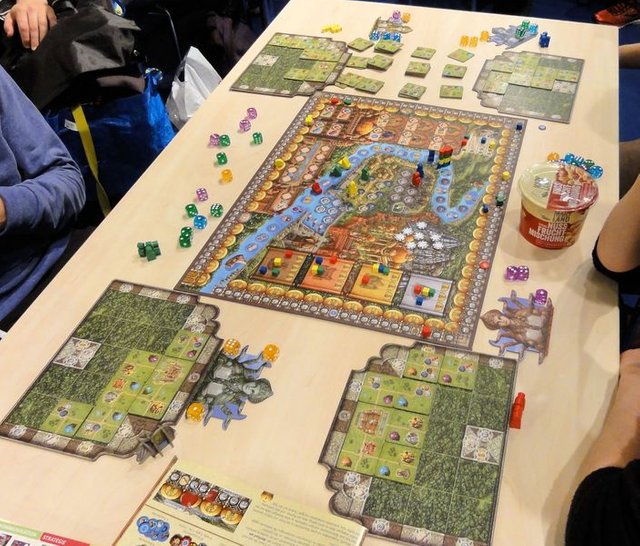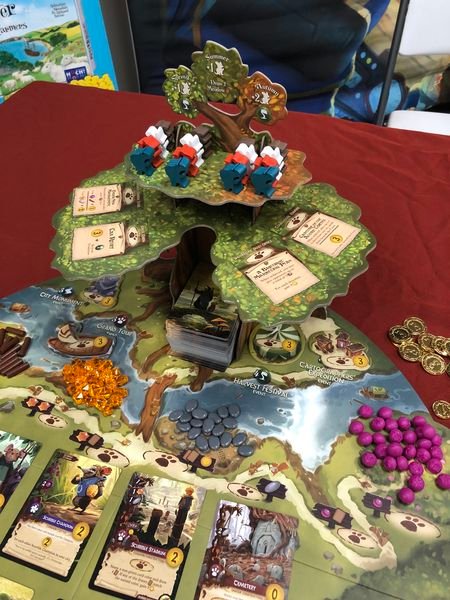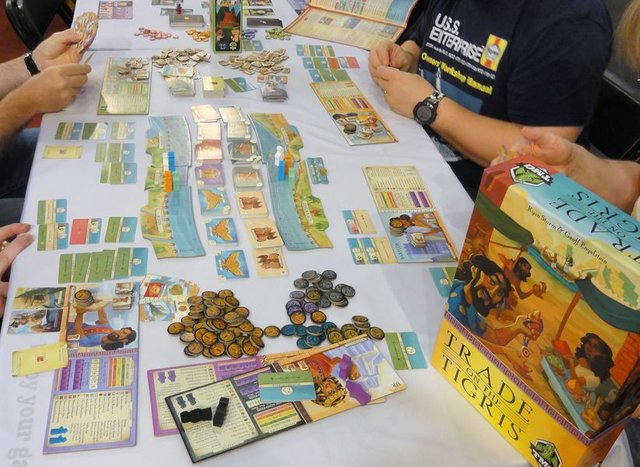Favorite Tabletop Games of last year(ish). Pt. 1
For about the last year I've been gaming pretty regularly with a new group here in Nashville. These guys are loaded with games, so I've been exposed to a lot of new stuff. Here is part one of a list of my favorites:
Rajas of the Ganges

OMG this game is so fun! 16th century Indian nobles compete for fame and wealth (the two victory point tracks) in a race to become the most glorious aristocrat, and I don't know...probably rule India or something. It's primarily a worker placement game, but instead of placing meeples you place D6s, which come in 4 colors. Whenever a player acquires any dice they are rolled, and that number is locked. The worker spots on the board are restricted as to what die can be placed on them, according to a die's color and/or number of pips. There are spots for getting more dice, trading into different colors, building palaces, trading at markets, gaining karma, a river to sail down for added bonuses, and damn this game is so beautiful and cool!
Additionally, each player has their own board that adds a tile placement element. Palaces built are placed here, with restrictions based on the direction of the roads depicted on the palace tiles, and other bonuses can be unlocked based on how you orient the palaces on your board. All of this is to the end of maximizing fame and wealth, which start on two opposing tracks. When a player's fame meets their wealth the game ends.
Worker placement games tend to start with x workers, with more that can be gained over the course of the game. One of the coolest elements of Rajas of the Ganges is that a player's number of workers (dice) can go up and down throughout the game. You can expend them early to take valuable spots, then take a couple turns to rebuild dice, or progress at whatever rate you like. The most viscerally fun element of the game is when effects start to chain: e.g. you score a palace, which gives you more fame, which gives you a bonus of moving down the river, which moves you up on the wealth track, which unlocks a bonus of more dice, etc. On top of all of this the board and beautifully colored dice make for one of the most aesthetically pleasing games.
Rajas of the Ganges is a blast, and my favorite of the last year.
EDIT: Totally forgot that this game does in fact have traditional meeples! Dice act meeple-ish, but are placed as an additional requirement of many of the spots on the board. This game has so much going on I’ve forgotten much of it :p - For real, go play it. It’s superb.
Cthulhu Wars

I tend to favor Euro games. I like puzzles, minmaxing, balancing resources, and eeking out incremental advantage. Cthulhu Wars is one of the only games I've ever played wherein I will forgo the strategically advantagous play in favor of grabbing one of those awesome looking elder god "minis" (they're gigantic, relatively speaking) and slamming it onto the board like Godzilla attacking Japan. The theme is apparent right? Pick one of those beloved Lovecraft elder gods (Cthulhu, Nyarlathotep, The King in Yellow, etc.) and their attending horrors, and place units to the end of area control ala Axis and Allies. As you would expect, every faction has different abilities, different strength in combat, and different ways to break and bend the rules. While the rules and mechanics are solid, the visual beauty of the minis (and the joy of crashing elder gods into each other, like you're a little kid playing with action figures) is what makes Cthulhu Wars one of my favorites. Regardless of whether or not it lends itself to victory, I will almost always choose to run my elder god headlong into another, which entails picking up the giant handful of dice and splashing them across the table.
Everdell

Another "worker placement with a twist," Everdell depicts adorable forest critters competing to build the greatest woodland metropolis. The meeples are in the shape of little cuties like squirrels and field mice, and resources come in the form of berries, wood, resin, and stone. These are used to acquire cards representing buildings and characters (both legendary and common, and of various factions), which go towards constructing your city. These yield resources, interact with one another (e.g., if you play the post office, you can play the mailbird without paying its cost, and that sort of thing) score points along different axes, and can also themselves be spots for workers to be placed. Everdell is played in four seasons (rounds), after each of which more workers are unlocked.
The game begins with a feeling of "how is this possibly enough time to play more than a few cards?" but as more workers are unlocked, and buildings yield cumulative bonuses you feel the squeeze of needing to select just the right actions to end with the highest value city possible. You can have more or fewer actions depending on how efficiently you manage placing workers, cards, using resources, and predicting what others are likely to do. I think a key to Everdell is maximizing how many actions you're able to take, and making sure no resources or options are left on the table before you pass to the next season.
Adding to the replayability and depth of Everdell are a few elements of variance: cards available for purchase in the meadow (public area), cards in each player's hand, four worker spots, and four end game bonuses are randomly distributed each game. This makes the game unlikely ever to solve, and allows for a variety of strategies from game to game. Despite it's cuddly theme, Everdell has the constrained decision-making that I love in games. Resources are stretched tight, and there is stiff competition for the stronger spots on the board and more powerful cards in the meadow. Highly recommended for gamers that enjoy navigating tight decisions.
Trade on the Tigris

Trade on the Tigris is unique among games I've played. Ancient Mesopotamian civilizations (you know, those Biblical ones: Babylon, Ur, Assyria, etc.) build up through trading goods and interacting with one another's cultures. Civilizations move along a government and religion track in a tug-of-war style: moving towards democracy moves away from dictatorship, while moving towards Ashur moves away from Marduk. The more focused your culture, the more you access powerful abilities, wealth, and end game payoffs. It's a delicate balance however, because moving too far down a given track renders too single-minded a society, beset by zealotry, fanaticism, tyranny, or bureaucracy.
The primary mechanic/phase of the game is a real time trading phase in the middle of each round. At the beginning of the turn each player draws trade good cards. These depict a good at the top, and how you move along the government or religion track on bottom. A five minute timer is set, and players persuade, interupt, talk over one another, yell, bully, and even lie in an effort to collect sets of goods. At the end of the trading phase, sets are turned in. Points are gained, and players move along the government and religion tracks according to these sets. Not only can you interupt, be rude, and talk over one another during trading, but the bottom part of the good may be lied about. Only the good itself has to be recounted truthfully.
For example, Susie says "I need fish, whose got fish? Preferably with dictatorship or Marduk." So you interupt Don, who talks too quietly anyway with "Oh I've got fish with dictatorship! I need barley." Susie trades with you, and though you must be honest about the card being fish, claiming dictatorship was a clever ruse. Your merchants actually advocate democracy, and spread their influence through this commercial activity, diluting Ninevah's culture and keeping them from accessing more powerful abilities. Got eem!
Trade on the Tigris is a creative design, and a lot of fun. It satisfyingly synthesizes elements of set collection, empire building, and a party game into a truly delightful package. AND it accommodates up to six players without an expansion. Six makes the trading phase maximally chaotic, so the more the merrier!
Thanks for telling us about these games - always interesting to read why others like this game or that :)